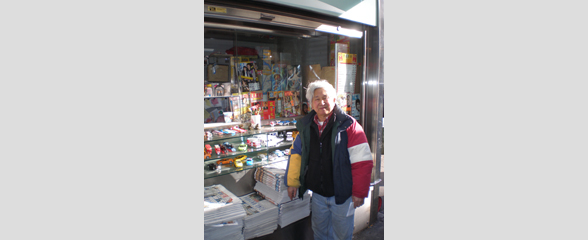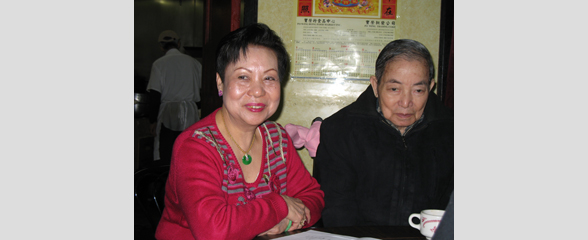Mom and pop business enterprises

2008.040.004 Oral History Interview with Francis Tso July 13, 2010
Francis Tso moved to the United States from Hong Kong in 1976, and settled two year later in Chinatown. For over thirty years, he and his wife have run a newsstand located on Canal Street that was handed down from Tso’s father and leased through the city. Tso portrays Chinatown as a haven for those who do not speak English and, while he says he has seen an increase in business at his stand as a result of development in the area, he also realizes that many non-English speakers are finding it increasingly difficult to stay in Chinatown. They are in an especially hard situation, he says, because their lack of English knowledge prohibits them from moving elsewhere. Over the thirty years that Tso has lived and worked in Chinatown, he has seen many buildings and business dissolved or torn down. As his stand is on Canal Street, he has also witnessed firsthand the increase in the counterfeit market on Canal. Again, Tso sees two sides to the issue. While more customers at the counterfeit stands means more potential customers at his newsstand, he would like to see a community center built in Chinatown that could offer a place for young people to “hang outâ€â€”keeping them away from the counterfeit market. When asked if he might consider retiring, Tso firmly answers that he will continue to operate the stand as long as he is physically able, even though none of his children are interested in running the stand themselves.

2008.040.018 Oral History Interview with Mr. and Mrs. Chan March 7, 2008
Mr. and Mrs. Chan, founders and owners of the long established and renowned coffee
shop and restaurant, Mei Lai Wah, in New Yorks Chinatown, are both Taishan natives, who claim that New York, especially their restaurant, is home to them. Upon arrival, Mr. Chan was employed at a bakery, the culinary training from which he later applied to his own business, Mei Lai Wah. Mr. Chan explains that he runs his business like a family and has not changed anything since he first opened it in 1968. He celebrates that his employees, who are also from the same village as Mr. Chan, have stayed with the business since its opening. As a result of rising rent, Mr. and Mrs. Chan have witnessed family-owned business closures and fear that the increasing expense of living in Chinatown may drive Chinese immigrants to settle outside of the unique cultural community. Despite their concerns over rent increases and their employees increasing age, both Mr. and Mrs. Chan hope to sustain their beloved business for as long as possible. Ultimately, when Mr. and Mrs. Chan decide to retire, they will not be handing down the restaurant to their children since none of them have expressed interest in continuing the operations of the business or living in Chinatown.